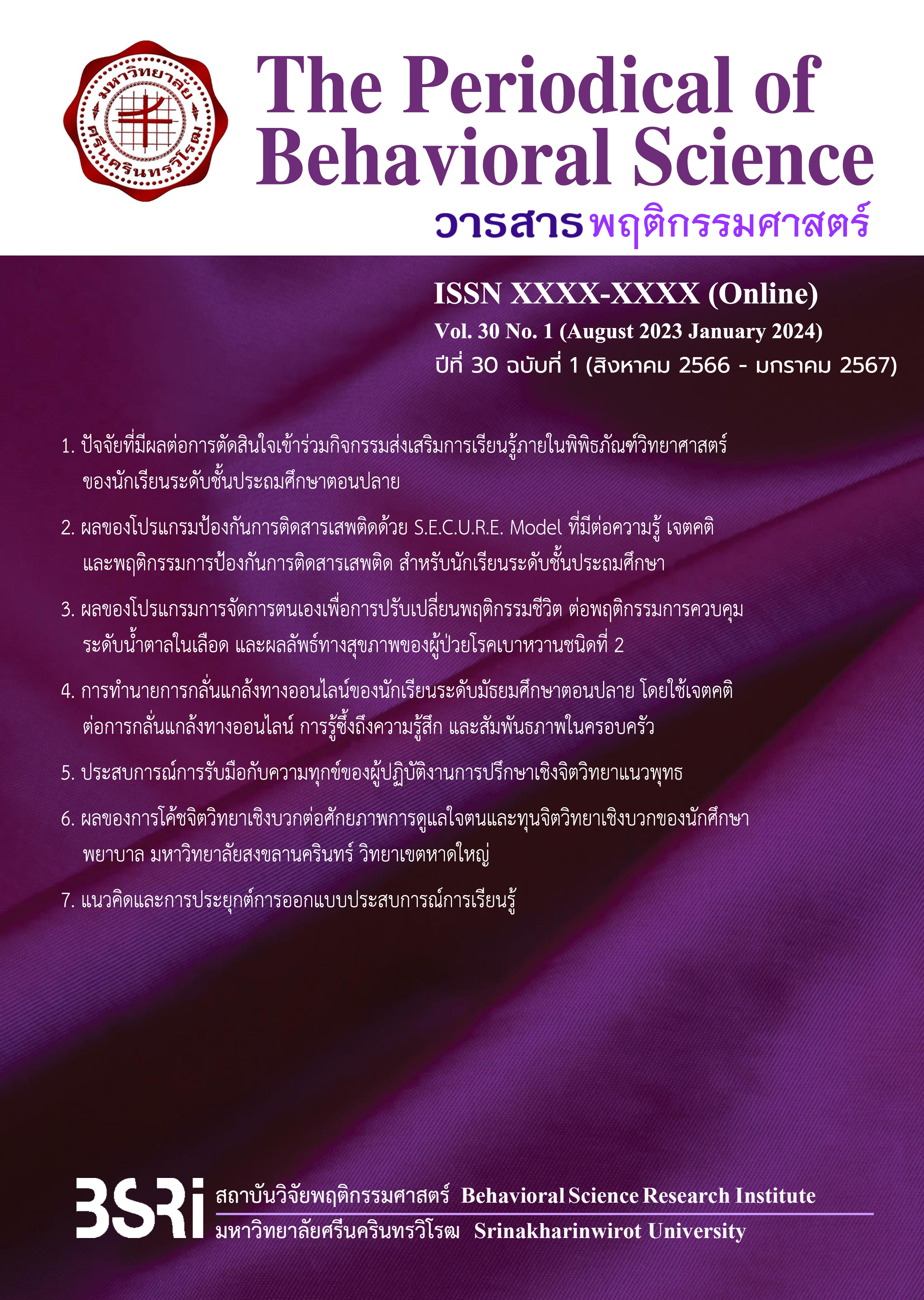The Effects of Self Management for Lifestyle modification Program on Glycemic Control Behavioral and Health Outcome in Patients with Type II Diabetes
Keywords:
self-management, glycemic control behavior, lifestyle behavior changes, Diabetes Mellitus type2Abstract
This quasi-experimental study, the efficacy of a self-management intervention designed to modify lifestyle behaviors related to blood glucose regulation was evaluated. The target population comprised patients diagnosed with type 2 diabetes mellitus. Through simple random sampling, participants were allocated into experimental and control cohorts, each consisting of 14 individuals. While the control group received care consistent with hospital-established protocols, the experimental group underwent the aforementioned self-management regimen. Data were procured using a behavioral scale assessing blood glucose regulation and by examining medical records for blood glucose readings. For data interpretation, both descriptive statistics and repeated measures analysis of variance were employed. Findings revealed a notable statistical distinction between the experimental and control groups in their blood glucose regulatory behaviors within at least one measurement period. (F = 75.76, p < .01). Interestingly, inter-group disparities in blood glucose measurements were not consistently observed across all intervals (F = .05, p = .844). Nonetheless, a significant variation in average blood glucose levels between the two groups was discernible in specific intervals (F = 541.05, p < .01). Subsequent evaluations indicated that the experimental group not only displayed enhanced regulatory behaviors post-intervention but also exhibited reduced blood glucose levels compared to pre-trial values. Consequently, endorsing and facilitating self-management practices is pivotal for sustaining effective blood glucose regulatory behaviors among individuals with type 2 diabetes mellitus.
Downloads
References
American Diabetes Association. (2017). Standards of Medical Care in Diabetes-2017. Diabetes Care, 40(1), 25-32.
Brown, S. A., Garcia, A. A., Kouzekanani, K., & Hanis, C. L. (2002). Culturally competent diabetes self-management education for Mexican Americans: the Starr County border health initiative. Diabetes Care, 25(2), 259-68. https://doi.org/10.2337/diacare.25.2.259
Cheunwattana, W., & Sornphakdee, N. (2014). Self-care behaviors of diabetic patients Bang Mae Nang Subdistrict, Bang Yai District, Nonthaburi Province. Pathumthani University Academic Journal, 6(3), 163-170.
Creer, T. (2000). Self-management of chronic illness. In M. Boekaerts, P. R. Pintrich, & M. Zeidner (Eds.). Handbook of self-regulation (pp. 601-29). Academic.
Davies, M. J., D'Alessio, D. A., Fradkin, J., Kernan, W. N., Mathieu, C., Mingrone, G., Rossing, P., Tsapas, A., Wexler, D. J., & Buse, J. B. (2018). Management of Hyperglycemia in Type 2 Diabetes, 2018. A Consensus Report by the American Diabetes Association (ADA) and the European Association for the Study of Diabetes (EASD). Diabetes Care, 41(12), 2669-2701. https://doi.org/10.2337/dci18-0033
Department of Disease Control. (2017). 20year National Strategy for Disease Prevention and Control 2017 - 2036. Aksorn Graphic and Design Publishing.
Diabetes Association of Thailand under The Patronage of Her Royal Highness Princess Maha Chakri Sirindhorn. (2017). Clinical Practice Guildline for Diabetes 2017. Romyon Media.
Duangklad, K., Lapvongwatana, P., & Chansatitporn, N. (2020). Improvement of Self-Management Program in Uncontrolled Type II Diabetes Patients. Journal of Health and Nursing Research, 36(1), 66-83.
Fisher, E. B., Ballesteros, J., Bhushan, N., Coufal, M. M., Kowitt, S. D., McDonough, A. M., Parada, H., Robinette, J. B., Sokol, R. L., Tang, P.
Y., & Urlaub, D. (2015). Key Features of Peer Support in Chronic Disease Prevention and Management. Health affairs (Project Hope), 34(9), 1523–1530. https://doi.org/10.1377/hlthaff.2015.0365
Garcia, A. A., Villagomez, E. T., Brown, S. A., Kouzekanani, K., & Hanis, C. L. (2001). The Starr County Diabetes Education Study: Development of the Spanish-language diabetes knowledge questionnaire. Diabetes care, 24(1), 16–21. https://doi.org/10.2337/diacare.24.1.16
Garedow, A. W., Jemaneh, T. M., Hailemariam, A. G., & Tesfaye, G. T. (2023). Lifestyle modification and medication use among diabetes mellitus patients attending Jimma University Medical Center, Jimma zone, south west Ethiopia. Scientific reports, 13(1), 4956. https://doi.org/10.1038/s41598-023-32145-y
Hessler, D., Fisher, L., Glasgow, R. E., Strycker, L. A., Dickinson, L. M., Arean, P. A., & Masharani, U. (2014). Reductions in regimen distress are associated with improved management and glycemic control over time. Diabetes Care, 37(3), 617-624. https://doi.org/10.2337/dc13-0762
Homchui, P., Wanaratvijid, C., & Pratoomsoot C. (2020). Effect of Self-Management Support for Self-Care Behavior and Blood Glucose Level in Patients with Type 2 Diabetes Mellitus. Boromarajonani College of Nursing, Uttaradit Journal, 12(1), 240-254.
House, J. S. (1981). Work Stress and Social Support. Addison-Wesley.
Kezerle, L., Shalev, L., & Barski, L. (2014). Treating the elderly diabetic patient: Special considerations. Diabetes Metab Syndr Obes, 7,391-400. https://doi.org/10.2147/DMSO.S48898.
Moungkum, S., Srisopa, P., Kunsongkeit, W., Ponpinij, P., Wiseso, W., Chantamit-O-Pas, C., & Deerochanawong, C. (2020). Factors Influencing Microvascular Complications among Persons with Type 2 Diabetes. The Journal of Faculty of Nursing Burapha University, 28(2), 74-84.
Runnun, S., & Loaseenat, P. (2019). The Development of a Clinical Nursing Practice Guideline (CNPG) for self-management supporton type 2 diabetes Mellitus Patients that cannot control their blood sugar level Kantharawichai Hospital Maha Sarakham province. Mahasarakham Hospital Journal, 16(3), 138-148.
Sathayasomboon, P., Sroisong, S., Foungtong, P., & Kaewtunkham, K. (2020). Effect of a Self-Management program on level of blood glucose among patients with type 2 Diabetes. Journal of Graduate Studies Review MCU Phrae, 6(1), 166-181.
Smith, S. M., Paul, G., Kelly, A., Whitford, D. L., O'Shea, E., & O'Dowd, T. (2011). Peer support for patients with type 2 diabetes: cluster randomised controlled trial. BMJ, 25(2), 1-8. https://doi.org/10.1136/bmj.d715
Strategy and Planning Division. (2019). Public Health Statistics 2019. http://dmsic.moph.go.th/index/detail/8297
Whiting, D. R., Guariguata, L., Weil, C., & Shaw, J. (2022). IDF diabetes atlas: Global estimates of the prevalence of diabetes for 2011 and 2030. Diabetes Research and Clinical Practice, 94(3), 311-321.
World Health Organization. (2023). WHO Mortality Database 2022. https://platform.who.int/mortality/themes/theme-details/topics/topic-details/MDB/diabetes-mellitus-and-endocrine-disorders
Downloads
Published
How to Cite
Issue
Section
License
Copyright (c) 2024 Warasan Phuettikammasat

This work is licensed under a Creative Commons Attribution-NonCommercial-NoDerivatives 4.0 International License.
Behavioral Science Research Institute, SWU
114 Sukhumvit 23, Bangkok 10110, Thailand.
Tel.02-649-5000 # 17600



